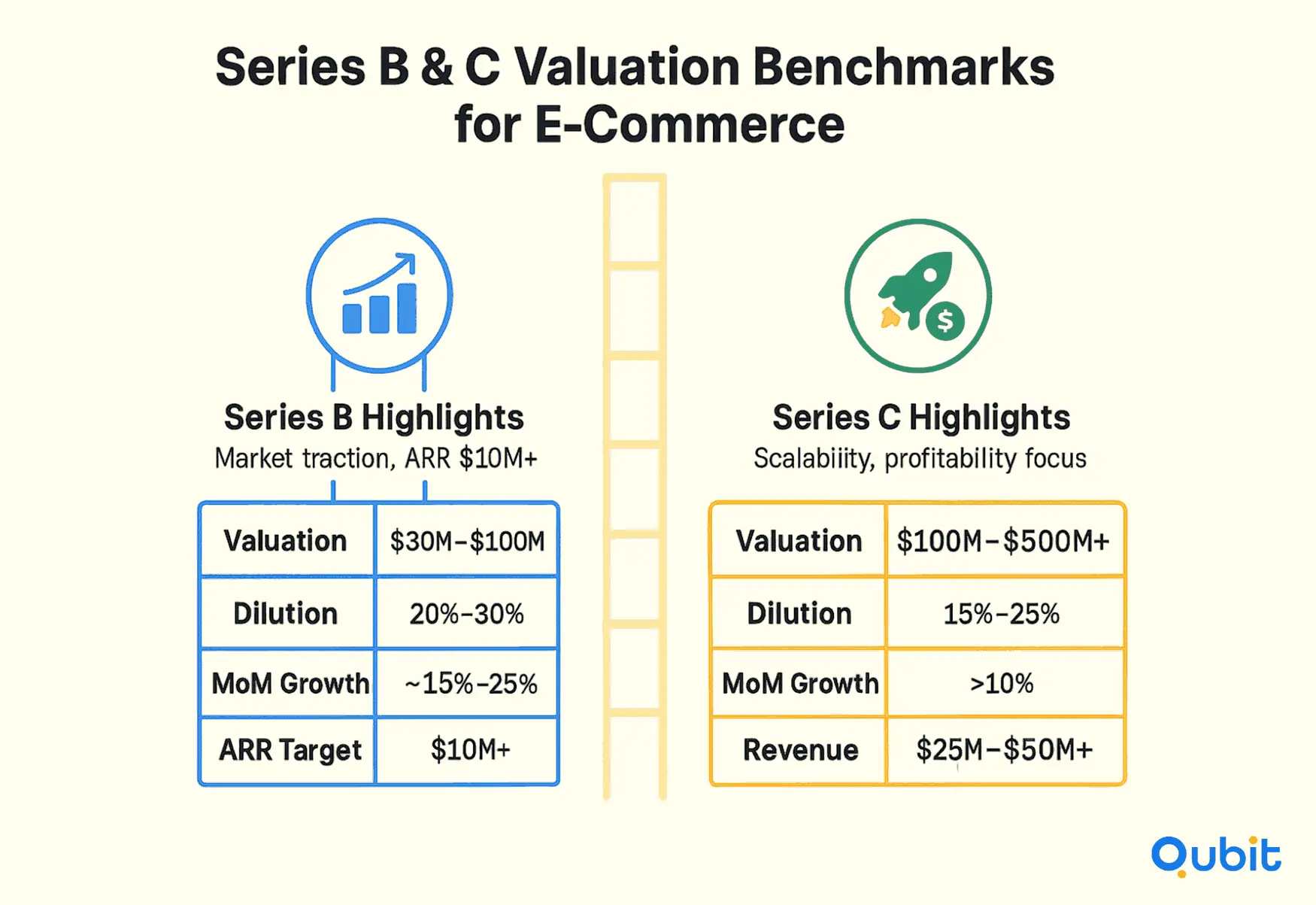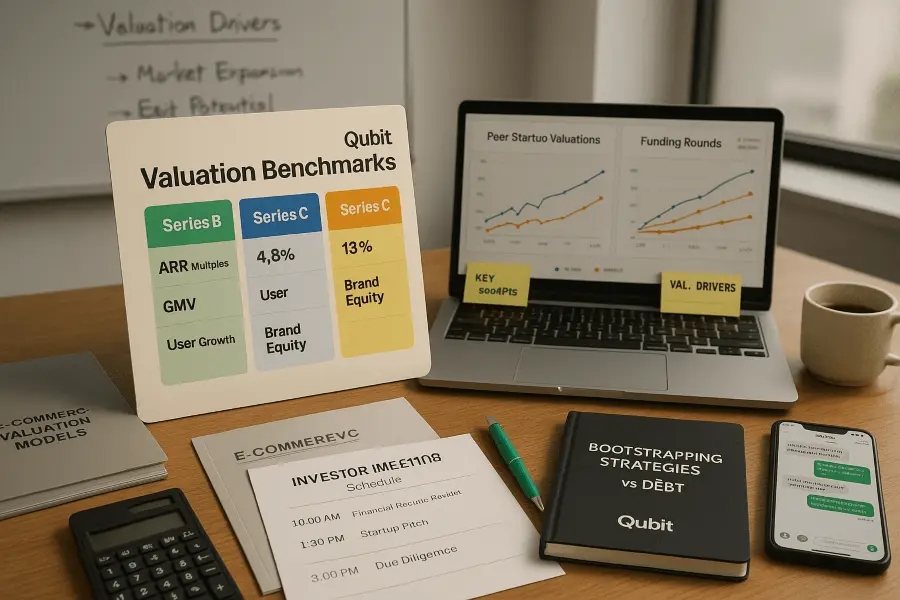Understanding valuation benchmarks for Series B and C rounds is critical for e-commerce startups aiming for substantial growth and market impact. Accurate valuations reflect the financial health, growth potential, and investment attractiveness of your company, influencing everything from negotiation leverage to future growth trajectories.
This article delves into the valuation benchmarks specifically applicable to Series B and C rounds, emphasizing key metrics, trends, and strategies crucial to securing optimal valuations.
Why Valuations Matter in Series B & C
Valuations significantly impact your e-commerce business's ability to attract investors, retain equity, and scale operations effectively. After surpassing the initial validation (Series A), investors focus intently on robust market traction, sustainable revenue growth, and clearly articulated scalability plans.
Valuation directly affects how much capital you raise relative to equity dilution, essentially, how much ownership founders retain. Incorrect valuations could result in excessive dilution or inadequate funding, stifling growth potential.
When it’s time to lock in the right investors for your online store, How to Secure Funding for E-Commerce Start-ups lays out the step-by-step playbook founders actually follow.
Typical Valuation Ranges for Series B & C E-Commerce Start-ups

Series B Valuation Benchmarks
Series B rounds usually indicate startups demonstrating significant market traction, scalable business models, and proven customer engagement. Valuations at this stage vary widely based on performance metrics, market sector, and competitive positioning.
Median Valuation: Approximately $30M–$100M
Average Equity Dilution: Around 20%–30%
According to CB Insights, e-commerce companies raising Series B often have:
Annual recurring revenue (ARR) exceeding $10M
Strong month-over-month (MoM) growth rates (~15%–25%)
Clear unit economics and customer acquisition strategies
Series C Valuation Benchmarks
By Series C, e-commerce businesses must demonstrate exceptional scalability, stable revenue streams, and profitability potential. Investors at this stage expect rigorous financial management, substantial market share, and strategic growth roadmaps.
Median Valuation: Approximately $100M–$500M+
Average Equity Dilution: Approximately 15%–25%
At Series C, typical benchmarks include:
Annual revenues exceeding $25M–$50M+
Sustained growth (MoM growth above 10%)
Demonstrated pathway to profitability or clear EBITDA improvement metrics
Core Metrics Influencing E-Commerce Valuations
Investors use specific metrics to assess valuation during Series B and C rounds. Understanding and improving these metrics is critical for positioning your startup favorably.
Revenue Growth Rate
Revenue growth is a primary driver of valuations at the Series B and C stages. Investors reward startups showing sustained high revenue growth (20%+ MoM growth).
Series B ideal: 15%–25% MoM growth
Series C ideal: 10%–20% MoM growth
Turning early traction into lasting revenue requires more than guesswork, Scaling E-Commerce Start-ups with Growth Funding maps the smart moves that push your topline higher.
Customer Acquisition Costs (CAC) and Lifetime Value (LTV)
CAC and LTV strongly influence valuation multiples. Investors favor startups with robust customer retention strategies and profitable acquisition metrics.
Ideal CAC:LTV ratios range from 1:3 to 1:5.
Lower CAC, indicating efficient customer acquisition channels, directly boosts valuation.
EBITDA and Profitability
Earnings Before Interest, Taxes, Depreciation, and Amortization (EBITDA) and clear profitability milestones significantly impact Series C valuations. Companies approaching profitability or generating positive EBITDA attract higher valuation multiples.
Valuation Multiples and How They Work
Valuation multiples, especially revenue multiples, are commonly used metrics to benchmark startups against industry peers. E-commerce startups typically see multiples between 3x and 10x ARR, depending on growth rates, profitability potential, and market sector.
Series B: 3x–7x ARR
Series C: 5x–10x ARR, influenced by market leadership, product differentiation, and margin stability.
Benchmarking by E-Commerce Sector
Valuations differ significantly by sector within e-commerce. Below are approximate Series B and C benchmarks by sub-sector:
| Sector | Series B Valuation | Series C Valuation |
|---|---|---|
| DTC Brands | $30M–$75M | $100M–$300M |
| Subscription Boxes | $25M–$60M | $75M–$250M |
| Online Marketplaces | $50M–$100M | $150M–$500M |
| B2B E-commerce SaaS | $40M–$90M | $100M–$400M |
Trends Influencing E-Commerce Valuations (2024–2025)
The valuation landscape is continually evolving, shaped by macroeconomic trends and technological innovations.
Omnichannel Integration
Investors increasingly value seamless omnichannel experiences. Startups excelling in omnichannel delivery and integration receive higher valuation multiples due to expanded market access and consumer loyalty.
Sustainability and ESG
Startups demonstrating sustainability practices and ESG compliance attract enhanced valuations. Environmental responsibility, ethical sourcing, and transparency resonate deeply with today’s consumers and investors.
AI-Driven Personalization and Automation
AI technologies enabling personalized customer experiences and streamlined operational efficiency are pivotal. Startups leveraging AI effectively secure higher valuation multiples due to enhanced customer lifetime value and reduced operational costs.
Leveraging Strategic Partnerships and Marketplaces
Strategic partnerships significantly enhance valuations by opening additional revenue streams and improving operational efficiency. Collaborations with established marketplaces or strategic partners strengthen business models, increase market presence, and reduce risk perceptions among investors.
When you team up with the right marketplace or partner, Using Strategic Partnerships & Marketplaces to Unlock Growth Capital will help you understand how founders turned collaborations into real investment wins and, you can open doors to new funding,
Common Pitfalls to Avoid During Valuation Rounds
Valuation negotiations can derail if common pitfalls aren't avoided, including:
Overestimating Market Size: Unrealistic projections negatively impact credibility.
Underestimating Competition: Ignoring competition weakens your positioning.
Poor Financial Transparency: Lack of clear financial statements erodes investor confidence.
Overdilution: Raising capital without strategic foresight can excessively dilute founder equity, limiting future growth potential.
Strategies to Maximize Your Valuation in Series B and C Rounds
Strengthen Financial Reporting: Maintain clear, transparent financial records and projections.
Optimize Customer Metrics: Focus on increasing LTV, reducing CAC, and maintaining healthy retention rates.
Highlight Scalable Technology: Emphasize technological advantages like automation, AI integration, or proprietary data analytics systems.
Leverage Multiple Funding Sources: Explore hybrid financing structures (equity plus non-dilutive options like venture debt).
Conclusion
Valuations during Series B and C significantly influence your e-commerce startup’s trajectory. By strategically positioning your business around robust financial metrics, transparent reporting, and diversified growth strategies—including strategic partnerships and alternative financing—you maximize both valuation and long-term growth potential.
Equip your e-commerce startup with the right insights and strategy for optimal valuation outcomes in your next funding rounds.
If you're looking to secure investment, we at Qubit Capital can provide expert fundraising assistance to get you on the path to success. Start your journey today and let us help you achieve your funding goals.
Key Takeaways:
- Investors heavily prioritize growth rates, customer lifetime value (LTV), and cost of acquisition (CAC) for Series B and C valuations.
- Typical Series B valuations range between $30M–$100M, while Series C can range from $100M–$500M+, depending on metrics and sector
- Exploring non-equity options like venture debt and revenue-based financing helps limit dilution and enhance valuation.
- E-commerce startups leveraging AI, omnichannel integration, and ESG practices gain significant valuation premiums.
- Clear and realistic financial statements are essential for credibility and higher valuation multiples.
Frequently asked Questions
How are Series B and C valuations typically calculated for e-commerce startups?
They’re mainly calculated using multiples of annual recurring revenue (ARR), typically between 3x–10x ARR, depending on growth, profitability, and market position.


 Back
Back



